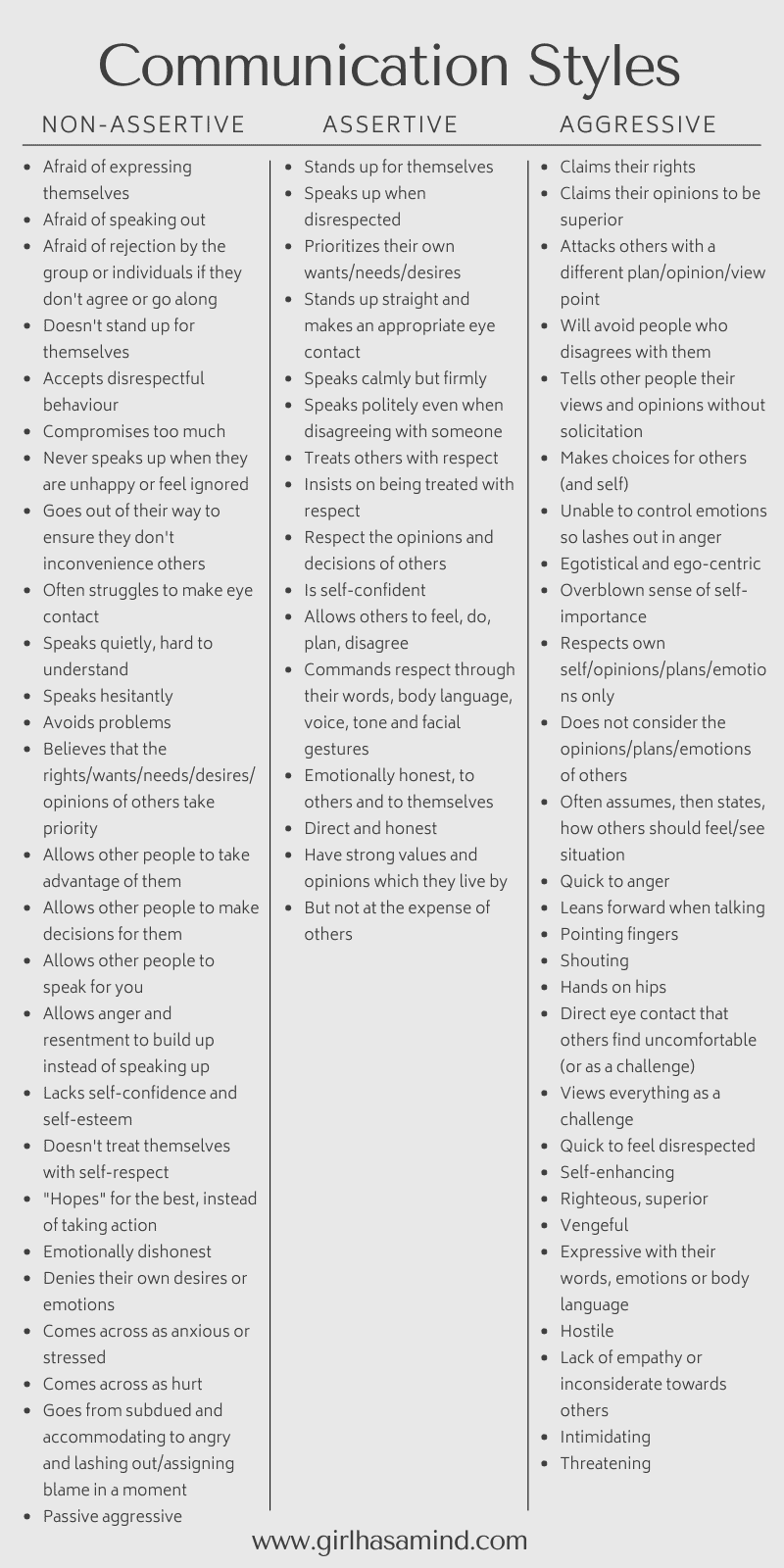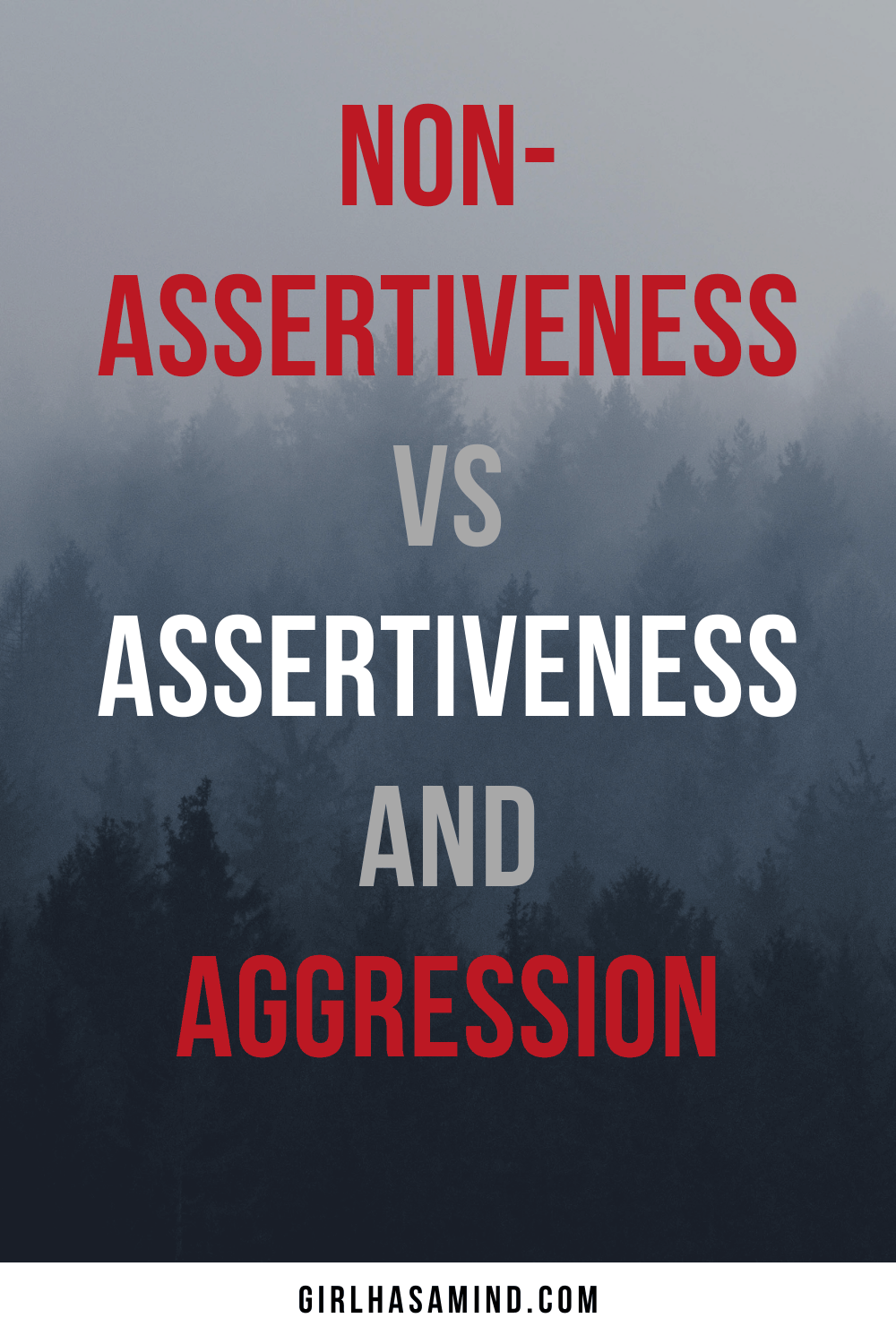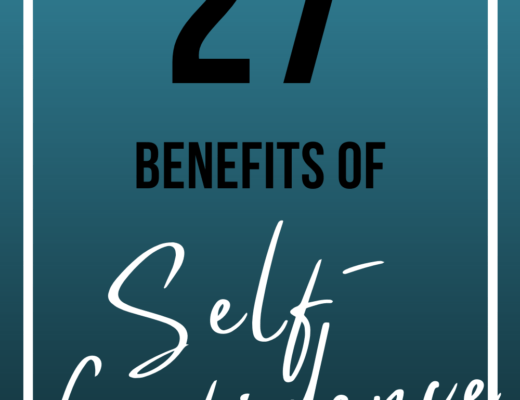Non-assertive people avoid problems and allow others to treat them with disrespect because they are too afraid to stand up for themselves.
Today I would like to talk about what it means to be non-assertive, why it’s important to be assertive, and how to communicate better to avoid aggression becoming a big problem.
Most of us have heard of the angry woman stereotype, and certainly, in the past, at work I’ve gotten a lot of flack for being “angry”. It was really hard for me to deal with because at no point was I ever angry. Helpful advice to “stop being so angry” was confusing because you can’t stop doing something you aren’t actually doing.
It wasn’t until I read Nice Girls Don’t Get The Corner Office that I understood the problem was with the way I was communicating. I was being TOO assertive, this made me come across as aggressive and angry. (In my defence, I never thought of myself as assertive either, I was just being honest and often saying no to stupid requests, but that’s a different story for another day.)
The truth is, no matter what you want to say – how you say it, the words that you use, your body language and facial expressions at the time, these all matter, whether you think it’s fair or not.
Let’s flip the gender roles for a moment and consider men.
If a man is being too assertive, and that comes across as angry and aggressive, how would other people respond?
Most of us have come across at least one man that we perceived to be angry and aggressive. In fact a colleague almost got arrested at the airport for shouting at the check-in staff. I know him very well, and I suspect he was just being overly assertive. I cannot imagine him being violent in any way.
But, being a man, if you communicate in a way that others perceive to be aggressive, then it can quickly escalate into a problem. In fact, this is probably how most fights between men start, with overly assertive communication which is perceived as aggression.
So the same applies for women, if you don’t communicate in the right way, your assertiveness could be mistaken for aggression, or being angry.
Of course, non-assertiveness is equally a problem.
Non-assertive people can easily become doormats for others, always saying yes to everything and everyone, without standing up for themselves.
Below I take a look at the different types of communication styles, and how to find a balance that works for you.

Related Posts
Non-assertiveness
I am not OK!
Non-assertive people tend to say yes to everything and everyone. They worry that to say no would invite rejection or conflict.
But saying yes all the time effectively means that you are prioritizing someone else’s wants and needs over yours. You are taking a submissive role in the relationship. This leads to feelings of resentment, low self-esteem, frustration and the sense that others are taking advantage of you or see you as worthless.
Their behavior is often passive as they simply go along with the plans or opinions of other people.
Non-assertive people also fail to stand up for themselves, they don’t speak up when they are unhappy or wronged in some way, they don’t make demands of others, and will allow other people to make decisions and choices for them. They also allow others to get away with awful behaviour.
All of this makes them feel helpless and insignificant, they see others as disrespectful, selfish and thoughtless. In the end, this isolates them from friends, family, or other groups, they become more and more invisible and their self-confidence takes a beating.
In my experience, people who say yes all the time, eventually build up so much anger, resentment and frustration inside, that it inevitably boils over and all that emotion then bursts out of them all at once.
This makes other people see them as irrational and moody, which is unfair of course, but unfortunately life is often unfair.
Not to mention that it’s hard for anyone to respect you if you don’t respect yourself enough to put your own needs first.

Assertiveness
I’m OK, you’re OK!
Assertiveness is somewhere between aggression and non-assertiveness.
An assertive person stands up for themselves in a respectful and polite way without making the other person feel that their opinions or plans are being bull-dozed (see aggression/too assertive below).
In other words, they do it in a way that makes it clear that they are prioritizing their own needs, but not at the expense of the thoughts and feelings of others. They don’t infringe on the basic rights of those around them.
They are honest and direct in how they feel and what they want, but in a way that still respects other people’s point of view.

It takes a lot of confidence to speak up and state your case for why you feel the way you feel, or why you don’t or do want to do something, especially if it goes against the group.
But by being assertive, and by communicating assertively, they are showing themselves respect. They make it clear that for their own mental health, this is the position they take and believe in, or the values they hold which they will not break.
For any relationship to be healthy, it’s essential that both parties learn to communicate in a positive, clear, respectful but assertive way.
Aggressiveness / Too Assertive
You’re not OK!
An aggressive person is someone who uses forceful words, behavior and body language to intimidate others into getting what they want.
This may include shouting or loud talking, being too direct and honest without caring if you hurt someone else’s feelings, and behavior or body language that is physically or verbally threatening.
An aggressive person ensures they get what they want even if it is at the expense of others, and is very likely unwilling to listen to another person’s viewpoint or counter-argument.
Other behavior can include making choices for others without asking or taking their opinion or voice into account, steamrolling people into situations without consulting them first, and generally controlling the environment in order to suit their own needs.
In my limited experience, I have often felt that people who behave too aggressively do so out of a lack of self-confidence. In some way they feel threatened so they lash out. Or they feel that others are not considering their feelings, wants or needs, or showing them the right amount of respect, all of which speaks to some inner insecurity or a chip on their shoulder regarding something.
These negative feelings then make them anxious and stressed, and this causes them to over-react and become too overly assertive or aggressive as they lack the skills for emotional control.

Characteristics of Communication Styles
Here are some examples of the characteristics of the different styles of communication:
Non-assertive
- Afraid of expressing themselves
- Afraid of speaking out
- Afraid of rejection by the group or individuals if they don’t agree or go along
- Doesn’t stand up for themselves
- Accepts disrespectful behaviour
- Compromises too much
- Never speaks up when they are unhappy or feel ignored
- Goes out of their way to ensure they don’t inconvenience others
- Often struggles to make eye contact
- Speaks quietly, hard to understand
- Speaks hesitantly
- Avoids problems
- Believes that the rights/wants/needs/desires/opinions of others take priority
- Allows other people to take advantage of them
- Allows other people to make decisions for them
- Allows other people to speak for you
- Allows anger and resentment to build up instead of speaking up
- Lacks self-confidence and self-esteem
- Doesn’t treat themselves with self-respect
- “Hopes” for the best, instead of taking action
- Emotionally dishonest
- Denies their own desires or emotions
- Comes across as anxious or stressed
- Comes across as hurt
- Goes from subdued and accommodating to angry and lashing out/assigning blame in a moment
- Passive aggressive
Assertive
- Stands up for themselves
- Speaks up when disrespected
- Prioritizes their own wants/needs/desires
- Stands up straight and makes an appropriate eye contact
- Speaks calmly but firmly
- Speaks politely even when disagreeing with someone
- Treats others with respect
- Insists on being treated with respect
- Respect the opinions and decisions of others
- Is self-confident
- Allows others to feel, do, plan, disagree
- Commands respect through their words, body language, voice, tone and facial gestures
- Emotionally honest, to others and to themselves
- Direct and honest
- Have strong values and opinions which they live by
- But not at the expense of others
Aggressive
- Claims their rights
- Claims their opinions to be superior
- Attacks others with a different plan/opinion/view point
- Will avoid people who disagrees with them
- Tells other people their views and opinions without solicitation
- Makes choices for others (and self)
- Unable to control emotions so lashes out in anger
- Egotistical and ego-centric
- Overblown sense of self-importance
- Respects own self/opinions/plans/emotions only
- Does not consider the opinions/plans/emotions of others
- Often assumes, then states, how others should feel/see situation
- Quick to anger
- Leans forward when talking
- Pointing fingers
- Shouting
- Hands on hips
- Direct eye contact that others find uncomfortable (or as a challenge)
- Views everything as a challenge
- Quick to feel disrespected
- Self-enhancing
- Righteous, superior
- Vengeful
- Expressive with their words, emotions or body language
- Hostile
- Lack of empathy or inconsiderate towards others
- Intimidating
- Threatening

Conclusion
Being able to communicate in a way that others can understand is the key to any success in life. Make that your goal and you will go far.




